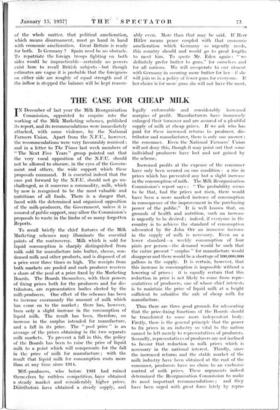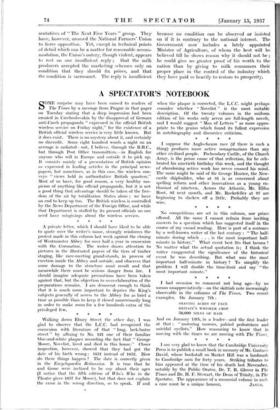THE CASE FOR CHEAP MILK
N December of last year the Milk Reorganisation I ComMission, appointed to enquire into the working of the Milk Marketing schemes, published ComMission, appointed to enquire into the working of the Milk Marketing schemes, published its report, and its recommendations were immediately attacked, with some violence, by the National Farmers Union. Apart from the N.F.U., however, the recommendations were very favourably received ; and in a letter to The Times last week members of " The Next Five Years " group pointed out that the very vocal opposition of the N.F.U. should not be allowed to obscure, in the eyes of the Govern- ment and others, the wide support which these proposals command. It is essential indeed that the case put forward by the N.F.U. should not go un- challenged, as it concerns a commodity, milk, which by now is , recognised to be the most valuable and nutritious of all foods. There is a • danger that, faced with the determined and organised opposition of the milk-producers, the Government, unless it is assured of public support, may allow the Commission's proposals to waste in the limbo of so many forgotten Reports.
To recall briefly the chief features of the Milk Marketing schemes may illuminate the essential points of the controversy. Milk which is sold for liquid consumption is sharply distinguished from milk sold for manufacture into butter, cheese, con- densed milk and other products, and is disposed of at a price over three times as high. The receipts from both markets are pooled and each producer receives a share of the pool at a price fixed by the Marketing Boards. The Boards themselves, with their powers of 'fixing prices both for the producers and for dis- tributors, are representative bodies elected by the milk-producers. One effect of the schemes has been to increase enormously the amount of milk which has come on to the market ; there has, however, been only a slight increase in the consumption of liquid milk. The result has been, therefore, an increase in the surplus intended for manufacture, and a fall in its price. The " pool price " is an average of the prices obtaining in the two separate milk markets. To prevent a fall in this, the policy of the Boards has been to raise the price of liquid milk to a point which will compensate for the fall in the price of milk for manufacture ; with the result that liquid milk for consumption costs more than at any time since 1914.
Milk-prOducers, who before 1981 had -ruined themselVes by rnthleSs coMpetition, have obtained a steady 'mar- ket and considerably higher priceS. Diaributori have obtained a steady supply, and legally enforceable and considerably increased margins of profit. Manufacturers have immensely enlarged their turnover and are assured of a plentiful supply of milk at cheap prices. If we ask who has paid for these increased returns to producer, dis- tributor and manufacturer, there is only one answer : the consumer. Even the National Farmers' Union will not deny this, though it may point out that some individual producers have lost and not gained by the scheme.
Increased profits at the expense of the consumer have only been secured on one condition : a rise in prices which has prevented any but a slight increase in the consumption of milk. The Milk Reorganisation Commission's report says : " The probability seems to be that, had the prices not risen, there would have been a more marked increase of consumption in consequence of the improvement in the purchasing power of the public." It is well known that, on grounds of health and nutrition, such an increase is urgently to be desired ; indeed, if everyone in the country is to achieve the standard of consumption advocated by Sir John Orr an immense increase in the supply of milk is necessary. Even on a lower standard—a weekly consumption of four pints per person—the demand would be , such that the entire present " surplus " for manufacture would disappear and there would be a shortage of 100,000,000 gallons in the supply. It is certain, however, that this increase in consumption is impossible without a lowering of prices ; it is equally certain that this reduction in price is not likely to come from repre- sentatives of producers, one of whose chief interests is to maintain the price of liquid milk at a height sufficient to subsidise the sale of cheap milk for manufacture.
Thus there are three good grounds for advocating that the price-fixing functions of the Boards should be transferred to some more independent body. Firstly, there is the general principle that the power to fix prices in an industry so vital to the nation cannot be left merely to representatives of producers. Secondly, representatives of producers are not inclined to favour that reduction in milk prices which is necessary in the national interest. Thirdly, since the increased returns and the stable market of the milk industry have been obtained at the cost of the consumer, producers have no claim to an exclusive control of milk prices. These arguments indeed determined the Reorganisation Commission to make its most important recommendations ; and they have been urged with great force lately by repre- sentatives of " The Next Five Years " group. They have, however, aroused the National Farmers' Union to fierce opposition. Yet, except in technical points of detail which can be a matter for reasonable accom- modation, the Union's outcry, though violent, appears to rest on one insufficient reply ; that the milk producers accepted the marketing schemes only on condition that they should fix prices, and that the condition is sacrosanct. The reply is insufficient because no condition can be observed or insisted on if it is contrary to the national interest. The Government now includes a lately appointed Minister of Agriculture, of whom the best will be believed till he shows reason why it should not be ; he could give no greater proof of his worth to the nation than by giving to milk consumers their proper place in the control of the industry which they have paid so heavily to restore to prosperity.











































 Previous page
Previous page